#pregnancy treatment in faridabad
Text
How can women manage the symptoms of vulvodynia?
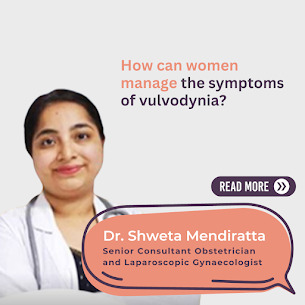
Women coping with vulvodynia can find relief through various strategies. Firstly, maintaining good hygiene practices is crucial—opt for gentle, fragrance-free products. Applying a water-based lubricant during intimate moments can alleviate discomfort. Wearing breathable cotton underwear aids in reducing irritation. Additionally, practicing stress-reduction techniques such as yoga or meditation contributes to overall well-being. Seeking support from healthcare professionals is essential for a personalized approach to managing symptoms. Remember, open communication with partners and doctors is key. By incorporating these lifestyle adjustments and seeking professional guidance, women can proactively manage vulvodynia symptoms and improve their quality of life. To manage vulvodynia symptoms, consult with Dr. Shweta Mendiratta, the Best Gynaecologist in Faridabad. As a Pregnancy Care specialist and Female Laparoscopic surgeon, she excels in holistic care. Her expertise extends to being a Fibroid treatment specialist and PCOD Specialist in Faridabad. Dr. Mendiratta provides personalized solutions, ensuring comfort and well-being for women facing vulvodynia challenges.
#best gynaecologist in faridabad#best lady gynecologist near me#fibroid treatment specialist in faridabad#best gynecologist doctor near me#pregnancy treatment in faridabad#best gynecologist in faridabad#lady doctor in faridabad#high risk pregnancy treatment in faridabad#gynecologist in faridabad#best gynecologist near me
0 notes
Text
Discover expert care for high-risk pregnancy in Faridabad. Our specialized team offers personalized treatment plans, ensuring the best possible outcomes for both mother and baby. Trust us for comprehensive care throughout your pregnancy journey.
#High-Risk Pregnancy Treatment#High Risk Pregnancy Cost in Faridabad#High-Risk Pregnancy Care in Faridabad#High-Risk Pregnancy#High-Risk Pregnancy surgery
0 notes
Text
https://drsabita.com/blogs/best-high-risk-pregnancy-doctor-in-faridabad/
#High-Risk Pregnancy doctor#High-Risk Pregnancy#High Risk Pregnancy Care#gynecologist surgeon in faridabad#High Risk Pregnancy Treatment in Faridabad
0 notes
Text

Yoga can help to ease some of the common discomforts of pregnancy, such as back pain, nausea and fatigue. It can also help you to cope with stress and anxiety that can come with pregnancy and parenthood. Pregnancy yoga Class
#pregnancy yoga#prenatal yoga#postnatal#pregnancy exercises#fertility yoga#pcod diet#pcod vs pcos#pcod problem treatment#best pcos treatment in faridabad#womens health#child care#india#yoga class
0 notes
Text
Best Hair Fall Doctor in Faridabad
Hair fall can be distressing, but with the right medical help, it can be effectively treated. If you're searching for the best hair fall doctor in Faridabad, look no further than Dr. Radhika Raheja at Radical Clinic. With years of experience and a proven track record, Dr. Raheja is recognized for offering the best solutions to hair loss problems.
What Causes Hair Fall?
Hair fall can occur due to several reasons, such as:
Genetic factors (hereditary)
Hormonal changes (like during pregnancy or menopause)
Poor nutrition
Stress and lifestyle habits
Scalp infections or medical conditions
Identifying the root cause of hair fall is crucial for effective treatment, which is where a dermatologist like Dr. Radhika Raheja excels.
Why Choose Dr. Radhika Raheja?
Dr. Radhika Raheja is one of the most trusted names in hair fall treatment in Faridabad. With her vast knowledge and experience, she provides personalized treatment plans based on each patient's unique condition. Her approach combines advanced medical techniques and patient care, making her the best hair fall doctor in Faridabad.
Expertise at Radical Clinic
Radical Clinic, led by Dr. Radhika Raheja, offers cutting-edge treatments for hair loss. The clinic is equipped with the latest technology and treatments, such as PRP (Platelet-Rich Plasma) therapy, mesotherapy, and advanced hair restoration techniques. Every patient receives a tailored solution that focuses on addressing the root cause of hair loss.
Treatments Offered
At Radical Clinic, a variety of treatments are available, including:
PRP Therapy: Using the patient’s own platelets to stimulate hair growth.
Mesotherapy: A treatment that nourishes hair follicles by injecting vitamins and minerals.
Medications: Prescribed solutions to treat underlying scalp or health issues.
Hair Transplantation: For severe cases of hair loss, this offers a permanent solution.
Why Dr. Radhika Raheja is the Best Choice
Years of experience: Dr. Raheja has extensive experience in dermatology and hair restoration.
Personalized care: Every patient receives a custom treatment plan.
Advanced technology: Radical Clinic uses modern and effective treatments.
Proven success: Numerous satisfied patients have experienced successful hair restoration.

0 notes
Text
High-risk pregnancy can be challenging, but with the right support and expertise, it can be managed effectively. Dr. Shweta Mendiratta, recognized as the Best High-Risk Pregnancy Doctor in Faridabad, offers exceptional care for expectant mothers. As a leading gynecologist in Faridabad, Dr. Shweta Mendiratta’s extensive experience in handling high-risk pregnancies ensures tailored treatments for individual needs. Here, we present seven crucial tips for managing a high-risk pregnancy, based on Dr. Mendiratta’s expertise.
#Best Gynaecologist in Faridabad#Best Gynecologist in Faridabad#est High-Risk Pregnancy Doctor in Faridabad#High-Risk Pregnancy
0 notes
Text
IVF Treatment in Faridabad
Introduction to IVF Treatment
IVF Treatment in Faridabad - In Vitro Fertilization (IVF) has revolutionized fertility treatment, offering hope to individuals and couples who struggle with infertility. This advanced reproductive technology involves fertilizing eggs with sperm outside the body, in a laboratory setting, before implanting the resulting embryos into the uterus. IVF is a complex yet highly effective procedure that has helped millions worldwide achieve their dream of parenthood. Prime IVF
The IVF Process
IVF treatment typically involves several key stages, each carefully managed to maximize the chances of a successful pregnancy:
Ovarian Stimulation: The process begins with ovarian stimulation, where medications are administered to stimulate the ovaries to produce multiple eggs. Monitoring through blood tests and ultrasound helps determine the optimal timing for egg retrieval.
Egg Retrieval: Once the eggs reach maturity, they are retrieved from the ovaries using a minimally invasive procedure under sedation. This procedure is usually performed transvaginally using ultrasound guidance.
Sperm Collection and Fertilization: Sperm samples are collected, prepared, and then combined with the retrieved eggs in a laboratory dish for fertilization. In some cases, Intracytoplasmic Sperm Injection (ICSI) may be used, where a single sperm is injected directly into an egg to facilitate fertilization.
Embryo Culture: Fertilized eggs (embryos) are cultured in the laboratory for several days, typically 3 to 5 days, to monitor their development. This allows embryologists to select the healthiest embryos for transfer.
Embryo Transfer: One or more selected embryos are transferred into the woman's uterus using a thin catheter, guided by ultrasound imaging. This procedure is usually quick and minimally invasive, similar to a pap smear.
Luteal Phase Support: Following embryo transfer, hormonal medications such as progesterone may be prescribed to support the uterine lining and improve embryo implantation.
Pregnancy Test: Approximately 10 to 14 days after embryo transfer, a blood test or urine test is performed to determine if the IVF cycle has resulted in pregnancy.
Success Rates and Factors Influencing IVF Success
IVF success rates can vary based on several factors, including age, underlying fertility issues, and the clinic's expertise. Key factors influencing IVF success include:
Age: Age is a significant determinant of IVF success, with younger women generally experiencing higher success rates. This is primarily due to age-related declines in egg quality and quantity.
Reproductive History: Factors such as previous pregnancies, miscarriages, or prior successful IVF cycles can impact success rates.
Cause of Infertility: The underlying cause of infertility, such as tubal factors, male factor infertility, endometriosis, or ovulatory disorders, can affect IVF outcomes.
Embryo Quality: The quality and developmental stage of embryos selected for transfer play a crucial role in IVF success. Advances in embryo selection techniques, including preimplantation genetic testing (PGT), can enhance success rates by identifying chromosomally normal embryos.
Lifestyle Factors: Factors such as body mass index (BMI), smoking, alcohol consumption, and stress levels can influence IVF success. Maintaining a healthy lifestyle and following medical recommendations can optimize outcomes.
Ethical Considerations and Legal Aspects
IVF treatment raises ethical considerations regarding embryo disposition, genetic testing, and the use of donor gametes. Fertility clinics adhere to ethical guidelines and legal regulations governing assisted reproductive technologies (ART), ensuring patient rights, informed consent, and responsible practices.
Embryo Disposition: Patients may face decisions regarding the disposition of unused embryos, including options for storage, donation for research, donation to other couples, or disposal.
Genetic Testing: Preimplantation genetic testing (PGT) allows for screening embryos for genetic disorders or chromosomal abnormalities before transfer, raising ethical considerations regarding embryo selection and the potential for future health implications.
Donor Gametes and Surrogacy: IVF may involve the use of donor sperm, eggs, or embryos, as well as gestational surrogacy, each raising ethical and legal considerations related to parental rights, donor anonymity, and agreements.
Emotional and Psychological Aspects
Undergoing IVF treatment can be emotionally challenging, involving stress, anxiety, and uncertainty. Fertility clinics recognize the psychological impact of infertility and provide counseling, support groups, and resources to help patients navigate the emotional aspects of their journey.
Counseling and Support: Emotional support is integral to the IVF process, offering counseling services, support groups, and educational resources to address stress, grief, and decision-making.
Managing Expectations: IVF success is not guaranteed, and managing expectations is essential. Clinics prioritize clear communication, realistic expectations, and compassionate care to support patients throughout treatment.
Conclusion
IVF treatment represents a remarkable advancement in reproductive medicine, offering hope and viable solutions to individuals and couples facing infertility. Through a carefully orchestrated process of ovarian stimulation, egg retrieval, fertilization, embryo culture, and transfer, IVF has enabled countless individuals to achieve their dream of parenthood. By addressing ethical considerations, legal aspects, and emotional support, fertility clinics ensure patient-centered care and ethical practice standards. As technology continues to evolve, IVF remains a cornerstone of assisted reproductive technologies, paving the way for future innovations and success stories in reproductive health.
This piece provides a detailed overview of IVF treatment, covering the process, success rates, ethical considerations, legal aspects, and the emotional journey involved. Let me know if there's anything else you'd like to explore or adjust!
0 notes
Text
Impact of Pelvic Inflammatory Disease on Fertility: What You Need to Know
A woman's fertility may be greatly impacted by Pelvic Inflammatory Disease (PID), a dangerous medical condition. Understanding the connection between PID and reproductive health is crucial for anyone affected by this condition. aims to shed light on how PID influences fertility and why consulting with the best sexologist in Faridabad can be pivotal for managing this condition.

Understanding Pelvic Inflammatory Disease
Pelvic Inflammatory Disease is an infection that affects the female reproductive organs, including the uterus, fallopian tubes, ovaries, and the surrounding tissues. PID usually results from sexually transmitted infections (STIs), such as chlamydia or gonorrhea, but it can also be caused by other types of bacterial infections. The infection causes inflammation and can lead to scarring, which has significant repercussions for fertility.
Symptoms and Diagnosis
PID may present with various symptoms, though some women may experience it without noticeable signs. Common symptoms include:
Abnormal vaginal discharge with a strong odor
Pelvic pain or discomfort
Painful intercourse
Irregular menstrual bleeding
Fever and chills
Diagnosis typically involves a pelvic examination, laboratory tests to detect STIs, and imaging studies like ultrasound or laparoscopy to assess the extent of damage to the reproductive organs. Early diagnosis is critical as untreated PID can lead to chronic pain and severe complications.
The Impact of PID on Fertility
Pelvic Inflammatory Disease can severely impact fertility in several ways:
Fallopian tube blockage and scarring: One of PID's most important side effects is the development of scar tissue in the fallopian tubes. In order to stop the egg from entering the uterus or the sperm from getting to the egg, this scarring may constrict or plug the tubes. This blockage can lead to infertility or increase the risk of an ectopic pregnancy, where the embryo implants outside the uterus.
Damage to the Reproductive Organs: PID can cause long-term damage to the uterus and ovaries. This damage can result in irregular ovulation, which complicates the chances of conception. Additionally, PID may affect the uterine lining, making it less hospitable for a fertilized egg to implant.
Chronic Pelvic Pain: Persistent pelvic pain is a common symptom of PID and can interfere with sexual activity and overall quality of life. This chronic discomfort can make it challenging for couples to maintain a healthy sexual relationship, further impacting fertility efforts.
Increased Risk of Ectopic Pregnancy: PID increases the risk of ectopic pregnancy due to the potential scarring and blockages in the fallopian tubes. An ectopic pregnancy is a dangerous condition where the embryo implants outside the uterus, often in the fallopian tubes, and can lead to life-threatening complications.
Treatment and Management
The management of PID involves antibiotics to treat the underlying infection. Early treatment is essential to prevent complications and preserve fertility. The particular bacteria causing the infection determines which medications are best. In some cases, if PID has caused significant damage, surgical intervention may be required to repair or remove scar tissue.
Consulting with the best sexologist in Faridabad is crucial for managing PID effectively. A specialized Sexual health clinic in Delhi can provide a comprehensive evaluation, offer personalized treatment plans, and support you through recovery. They can also help with managing any chronic pain or other complications associated with PID.
Preventive Measures
Preventing PID is vital for maintaining reproductive health. Here are some key preventive measures:
Practice Safe Sex: Use condoms to reduce the risk of sexually transmitted infections that can lead to PID. Safe sex practices are one of the most effective ways to prevent PID.
Regular STI Screenings: Regular screening for STIs can help detect infections early, allowing for prompt treatment and reducing the risk of PID.
Prompt Treatment of Infections: Seek medical attention if you experience symptoms of an STI or PID. Early treatment can prevent the infection from progressing and causing more significant damage.
Education and Awareness: Educate yourself about PID and its symptoms. Being aware of the signs and seeking medical help when needed can prevent long-term complications.
The Role of a Sexologist in PID Management
A sexologist specializing in sexual and reproductive health can play a crucial role in managing PID and its effects on fertility. The best sexologist in Faridabad can provide:
Expert Evaluation: An in-depth assessment to understand the extent of PID-related damage and its impact on fertility.
Treatment Options: Personalized treatment plans tailored to your specific needs, including antibiotic therapy and surgical options if necessary.
Fertility Counseling: Guidance on managing fertility challenges, including options like in vitro fertilization (IVF) if PID has significantly impacted your ability to conceive naturally.
Pain Management: Strategies to manage chronic pelvic pain and improve your overall quality of life.
Emotional Support: Emotional and psychological support to help you cope with the challenges associated with PID and its impact on your fertility and sexual health.
Living with PID and Moving Forward
Living with PID can be challenging, but with the right support and treatment, many women can manage the condition and maintain their fertility. Working with the best sexologist in Faridabad can provide you with the expertise and care needed to address PID and its effects on your reproductive health.
If you suspect you have PID or are experiencing symptoms, it’s essential to seek medical help promptly. Early intervention can prevent long-term complications and improve your chances of maintaining or achieving fertility.
Conclusion
Pelvic Inflammatory Disease is a significant condition that can impact fertility and overall reproductive health. Understanding the effects of PID and seeking prompt and effective treatment is crucial for managing this condition. Consulting with the best sexologist in Faridabad can provide you with the necessary support and expertise to navigate PID and its impact on your fertility. With the right care and treatment, many women can manage PID effectively and maintain their reproductive health.
Location:-Shop No-2, 2nd Floor, Saluja Complex, Neelam Chowk, near TCS Automobile, Fruit Garden, New Industrial Township, Faridabad, Haryana 121001
Contact:-+91-9873911911
0 notes
Text
The Impact of Untreated STIs on Sexual and Reproductive Health
Sexually transmitted infections (STIs) are a significant public health concern that can have severe consequences if left untreated. At Gautam Ayurveda Clinic, led by the Best Sexologist in Delhi, we understand the importance of addressing and managing STIs to safeguard sexual and reproductive health. In this article, we'll explore the effects of untreated STIs on both men and women and provide insights into prevention and treatment.
Understanding STIs and Their Consequences
STIs are infections transmitted through sexual contact, caused by bacteria, viruses, or parasites. Common STIs include chlamydia, gonorrhoea, syphilis, human papillomavirus (HPV), herpes, and HIV. When left untreated, these infections can lead to severe health issues.
Effects on Sexual Health
Chronic Pain and Discomfort: Untreated STIs can cause persistent pain and discomfort in the genital area. Conditions like genital herpes and HPV can lead to painful sores and warts.
Increased Risk of Transmission: Individuals with untreated STIs are more likely to transmit the infection to their sexual partners, perpetuating the cycle of infection.
Complications in Pregnancy: STIs can lead to complications during pregnancy, including premature birth, low birth weight, and transmission of the infection to the newborn.
Effects on Reproductive Health
Untreated STIs can have a profound impact on reproductive health:
Infertility: STIs such as chlamydia and gonorrhoea can cause pelvic inflammatory disease (PID) in women, leading to scarring of the fallopian tubes and infertility. In men, infections can result in epididymitis, which can also impact fertility.
Ectopic Pregnancy: PID increases the risk of ectopic pregnancy, where the fertilised egg implants outside the uterus, which can be life-threatening and often requires emergency surgery.
Chronic Pelvic Pain: Women with untreated STIs may develop chronic pelvic pain due to PID, significantly affecting their quality of life.
Prevention and Treatment
To safeguard your sexual and reproductive health, consider the following:
Regular Screenings: Regular STI screenings are crucial for early detection and treatment. Many STIs are asymptomatic, making regular check-ups essential.
Safe Sexual Practices: Using condoms and practising safe sex can significantly reduce the risk of contracting STIs. Limiting the number of sexual partners and maintaining a monogamous relationship can also help.
Prompt Treatment: If diagnosed with an STI, prompt treatment with appropriate medications can prevent complications. Both partners should be treated simultaneously to avoid reinfection.
Education and Awareness: Educating individuals about the risks of STIs and the importance of regular screenings and safe sexual practices is vital for prevention.
Why Choose Gautam Ayurveda Clinic?
Expert Guidance: Led by Dr. Indrgeet, the Best Sexologist in Delhi, our clinic offers expert guidance and personalised care tailored to your unique needs.
Holistic Approach: We focus on treating the root causes of sexual health issues, ensuring comprehensive and long-lasting solutions.
Proven Track Record: With a history of successfully treating sexual health issues, our clinic is committed to helping individuals achieve optimal well-being.
Conclusion
Untreated STIs can have devastating effects on both sexual and reproductive health, leading to chronic pain, infertility, and severe complications. Regular screenings, safe sexual practices, and prompt treatment are essential to prevent and manage STIs effectively. At Gautam Ayurveda Clinic, we are dedicated to providing comprehensive care and support for individuals facing sexual health challenges. Visit Gautam Ayurveda, the best sexologist in Delhi to explore natural and holistic solutions for sexual and reproductive health.
BY Kajal
Location - W/A 87, First Floor Mother Dairy ,Patparganj Road Near ICICI Bank Shakarpur, Station Gate, Street Number 2, near Metro Station Laxmi Nagar, Laxmi Nagar, New Delhi, Delhi 110092
Contract - +91-9899298991
0 notes
Text
How does a woman's immune system impact fertility?
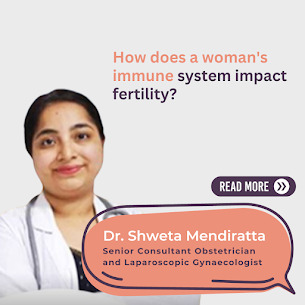
A woman's immune system plays a crucial role in fertility. Think of it as the body's defense team. Sometimes, it might get a bit too protective, making it tricky for an embryo to implant. Stress and inflammation can disrupt this delicate balance. A calm immune system supports fertility, letting nature take its course. Eating well, staying active, and managing stress can keep the immune system in check. It's like creating a welcoming environment for a little one to settle in. So, for a smooth fertility journey, nurturing both body and mind is key. Dr. Shweta Mendiratta, renowned as the Best Gynaecologist in Faridabad, sheds light on the vital link between a woman's immune system and fertility. As a Pregnancy Care specialist and Female Laparoscopic surgeon in Faridabad, she emphasizes its impact on conditions like PCOD and fibroids. Trust Dr. Shweta for expert advice, making her the go-to specialist for comprehensive women's health, including fibroid treatment in Faridabad.
#lady doctor in faridabad#fibroid treatment specialist in faridabad#best lady gynecologist near me#best gynecologist doctor near me#pregnancy treatment in faridabad#best gynecologist in faridabad#best gynaecologist in faridabad#high risk pregnancy treatment in faridabad#best gynecologist near me#gynecologist in faridabad
0 notes
Text
Find the best gynecologist in Faridabad for expert women's healthcare. Explore top-rated specialists offering personalized care in obstetrics, gynecology, fertility treatments,
and more. Book consultations for routine check-ups, pregnancy care, and specialized treatments.
0 notes
Text
Dr. Sabita Kumari in Faridabad specializes in high-risk pregnancy treatment, providing expert care and personalized solutions for expectant mothers facing complex medical conditions.
#High-Risk Pregnancy Treatment#High Risk Pregnancy Care#High Risk Pregnancy Treatment in Faridabad#High Risk Pregnancy Treatment
0 notes
Text
Best Ways To Get Rid of Stretch Marks
“Are you dealing with stretch marks? Are they bothering you? Our advanced treatments can help minimise them! “
Stretch marks are scars that occur when the skin stretches rapidly. These marks develop due to sudden changes in weight or rapid growth during pregnancy or puberty. Although stretch marks are considered permanent, they usually fade over time. Stretch marks are painless and appear as purple or red stripes, which usually fade into white, silvery or glossy lines. However, some individuals do not like how their skin looks with these stretch marks, especially when they are severe and cause social damage. Fortunately, there are certain treatments available that can help improve the appearance of stretch marks.
This article will first delve into what stretch marks are and their causes. We will also outline some effective treatments that help reduce the appearance of stretch marks. Dr. Rajat Gupta and Dr. Swati Agarwal, renowned skin specialists, have shared their inputs on drafting this post. The expert doctors practice at Skination Clinic and are well-known for offering the best stretch mark treatment in Faridabad. Let’s understand more about stretch marks first.
What are Stretch Marks?
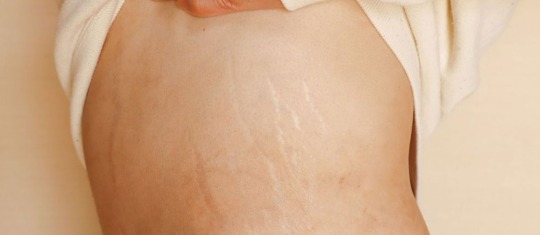
A stretch mark is a type of scar that develops when our skin either stretches or shrinks. Due to this, the elastin and collagen rupture and a scar is formed as the skin heals. They most commonly appear in areas where the fat gets stored, such as the inner thighs, arms, knees, abdomen, and back.
What Causes Stretch Marks?

Following are some of the common reasons that cause stretch marks:
Rapid Changes in Weight: Stretch marks appear in both weight gain and weight loss cases.
Pregnancy: Almost every woman experiences stretch marks during pregnancy; they usually fade and become less noticeable between 6-12 months post-birth.
Puberty: As our body goes through many changes and experiences rapid growth, stretch marks are common at this stage.
Medical Disorders: Certain medical conditions, such as Cushing syndrome or Marfan syndrome, lead to stretch marks. Marfan syndrome causes a loss in skin elasticity, but Cushing's disease may cause the body to generate a specific hormone at a greater level, resulting in rapid weight gain.
High Level of Cortisol Hormone: The fluctuation of cortisol, a stress hormone in the body, might affect the skin's elastin fibers as cortisol could convert to cortisone and affect elasticity.
Genetics: If an individual has a history of stretch marks, there is a high risk for the family members to develop them.
Gender: Females are likely to develop more stretch marks than males.
Are you dealing with stretch marks on your body and want to eliminate them? Visit Skination Clinic, the best skin clinic in Faridabad, for effective treatment. Let’s discuss how we can get rid of stretch marks.
How Can I Get Rid of Stretch Marks?
Like any other scar, stretch marks may never totally disappear, although they tend to reduce over time (maybe years). They impact our skin's appearance, disfigure its natural appearance, harm our self-esteem, and cause cosmetic issues. Treating stretch marks with products available at an online store may not provide effective results. So, if you want to get rid of stretch marks, it is best to seek help from a skin specialist who can provide effective treatments. Some of those include the following:
1. Creams, Lotions and Gels That Contain Retinoid and Hyaluronic Acid
Retinoids (vitamin A) can help reduce the appearance of early stretch marks. Products such as tretinoin (retinoic acid or synthetic vitamin A) assist in rebuilding collagen protein and improve the appearance of scars.
2. Microdermabrasion
This method helps produce elastin and collagen and reduces the appearance of stretch marks. By exfoliating and eliminating the top dead layer, microdermabrasion rejuvenates the skin by building new cells.
3. Laser Stretch Mark Removal
The laser stretch mark removal allows the skin to regenerate healthy tissues and stimulate collagen growth and healthy skin cells. The type of laser used depends on age, location of stretch marks, and skin colour. The excimer laser procedure eliminates thin layers of the skin around the marks and uses high-energy ultraviolet light. This breaks the bonds in skin issues and causes the tissue to disintegrate. Post-treatment, new layers of healthy skin will form.
Other Ways to Prevent Stretch Marks
Hydrate: The body requires sufficient intake of water to function properly. Staying hydrated also helps the skin retain its elasticity, which is important in preventing skin from becoming stretched and too thin.
Moisturise: There is no magic cream which can absolutely prevent stretch marks. However, keeping the skin supple may make the individual less susceptible to developing stretch marks. If stretch marks develop, moisturised skin will respond better to the treatment.
Eat Nutrient-Rich Foods: Eat nutritious food that gives the skin the vitamins it requires to improve its health and elasticity. Eat plenty of fruits, vegetables and healthy fats.
Final Takeaway
Stretch marks are usually caused by puberty, changes in weight, pregnancy, weight gain, etc. The online products can be expensive and might not provide effective results. If you find yourself spending too much money on these products without getting any results, you can seek the help of a skin specialist. Dermatological procedures have proven effective in helping individuals get rid of stretch marks.
You can consult Dr. Rajat Gupta and Dr. Swati Agarwal, renowned skin doctors, at Skination Clinic to get the best stretch mark treatment in Faridabad. Expert doctors use advanced lasers to help minimise the appearance of stretch marks. The advanced technologies, type of equipment and state-of-the-art facilities make Skination Clinic the best clinic for stretch mark removal.
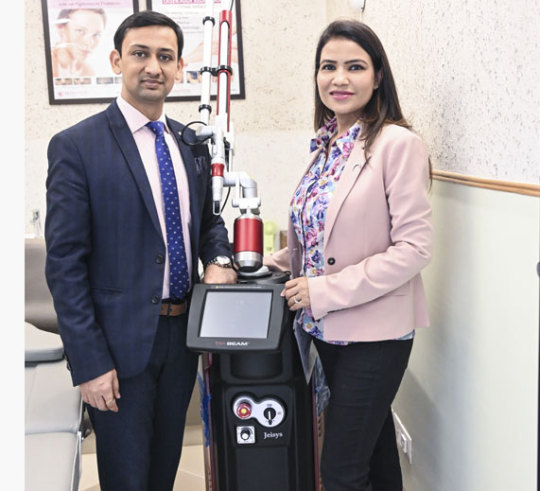
For more details on stretch marks treatment or to know the treatment cost, visit the clinic today. The cost of stretch marks treatment will vary from individual to individual and will depend on various factors. These include the areas treated, the severity of scars, the type of procedure used, the type of technology used, and so on.
To know the exact cost, visit the Skination Clinic today.
Original Source:- https://www.apsense.com/article/best-ways-to-get-rid-of-stretch-marks.html
#Stretch Marks#Stretch Marks Treatment#Causes Of Stretch Marks#Skin Clinic In Faridabad#Prevent Stretch Marks#stretch mark treatment in Faridabad#skination clinic
0 notes
Text
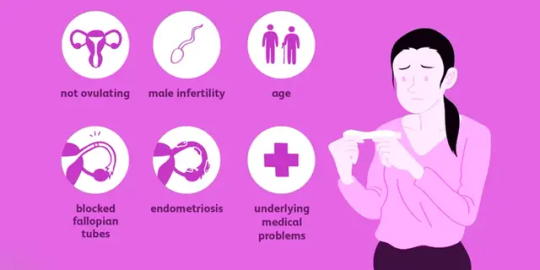
Male Factor Infertility: Diagnosis, Treatment, and Solutions
Introduction: Infertility can be a challenging journey for couples striving to conceive, and male factor infertility is a common contributing factor. Male factor infertility can now be effectively diagnosed, treated, and resolved thanks to technological advancements in medicine. In Faridabad, specialized clinics like Revyve IVF provide comprehensive infertility treatment options specific to male factor infertility.
Knowing About Male Factor Infertility: Male factor infertility refers to fertility issues stemming from problems with the male reproductive system, such as low sperm count, poor sperm motility, or abnormal sperm morphology. These issues can interfere with the ability of sperm to fertilize an egg, leading to difficulties in conception. Male-factor infertility accounts for a significant portion of infertility cases, highlighting the importance of addressing these issues in fertility treatment.
Diagnosis of Male Factor Infertility: Diagnosing male factor infertility typically involves a comprehensive assessment of the male partner's reproductive health. This evaluation may include a thorough medical history, physical examination, and DNA analysis to assess sperm count, movement, and morphology. Additional tests, such as hormone assays, genetic testing, and imaging studies, may be conducted to identify underlying causes of male factor infertility, such as hormonal imbalances or anatomical abnormalities.
Treatment Options for Male Factor Infertility: Once male factor infertility has been diagnosed, several treatment options may be considered to improve sperm quality and increase the chances of conception. These treatment options may include:
Lifestyle Modifications: Making lifestyle changes, such as maintaining a healthy diet, exercising regularly, avoiding excessive alcohol consumption, and quitting smoking, can help improve sperm quality and overall reproductive health.
Medications: Certain medications may be prescribed to address underlying hormonal imbalances or medical conditions that contribute to male factor infertility. These medications may help improve sperm production, movement, and activity.
Artificial Fertility Methods: Assisted reproductive techniques, such as intrauterine insemination (IUI) or in vitro fertilization (IVF), may be recommended for couples with male factor infertility. These techniques involve the collection of sperm and the introduction of sperm directly into the female reproductive tract to promote fertilization.
Surgical Interventions: In some cases, surgical interventions may be necessary to correct anatomical abnormalities or blockages in the male reproductive system that contribute to male factor infertility. Procedures such as varicocelectomy or sperm retrieval techniques may be performed to improve sperm quality and increase the probability of conception.
Solutions for Male Factor Infertility: In addition to medical treatments, there are several solutions available for couples facing male-factor infertility. These solutions may include:
Advice and Support: Dealing with infertility can harm both partners emotionally and psychologically. Therapy and support services can provide couples with the guidance, encouragement, and coping strategies needed to navigate their fertility journey together.
Alternative Family-Building Options: For couples facing severe male factor infertility or unsuccessful fertility treatments, alternative family-building options such as sperm donation, egg donation, or surrogacy may be considered. These options provide hope for couples to achieve their dream of parenthood, even in the face of male factor infertility.
Conclusion: Male factor infertility can present challenges for couples trying to conceive, but with the right diagnosis, treatment, and solutions, it is regularly possible to overcome these obstacles and achieve pregnancy. At Revyve IVF, we provide comprehensive care and personalized treatment plans to address male-factor infertility and help couples realize their dream of starting or expanding their family.
0 notes
Text
Dr Deepa Aggarwal
Dr Deepa Aggarwal, Om Medical Centre
Dr. Deepa Aggarwal is the best Gynecologist in Faridabad, Haryana. With the experience of 25 years as a Gynecologist and Fertility Specialist in Faridabad, Haryana. With her expertise in Gynecologist and Fertility Specialist, she offers a wide range of services.
High-Risk Pregnancy
Sexually Transmitted Diseases (STDs)
Infertility
Menopause
Endometriosis
Fibroid Treatment
PCOS Care
Intrauterine Insemination (IUI)
Adolescent Health
Normal Delivery
Health Check-up
Laparoscopy
Vaccination and Check-up
Dr. Deepa Aggarwal is highly recommended by her patients for her expertise and appropriate diagnosis. She is the most reputed Gynaecologist in Faridabad, Haryana. Visit her website to book an appointment & start a journey to better health.
098711 44120
Dr. Deepa Aggarwal - Om Medical Centre, House No.-1882 Sector 8, 7/8 Dividing Road Faridabad Haryana 121006
0 notes
Text
High-risk pregnancy can be challenging, but with the right support and expertise, it can be managed effectively. Dr. Shweta Mendiratta, recognized as the Best High-Risk Pregnancy Doctor in Faridabad, offers exceptional care for expectant mothers. As a leading gynecologist in Faridabad, Dr. Shweta Mendiratta’s extensive experience in handling high-risk pregnancies ensures tailored treatments for individual needs. Here, we present seven crucial tips for managing a high-risk pregnancy, based on Dr. Mendiratta’s expertise.
#Best Gynaecologist in Faridabad#Best Gynecologist in Faridabad#est High-Risk Pregnancy Doctor in Faridabad#High-Risk Pregnancy
0 notes